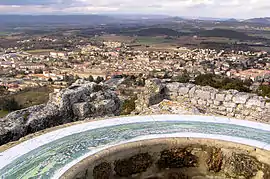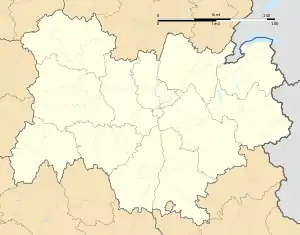Saint-Paul-Trois-Châteaux
| |
|---|---|
 A general view of Saint-Paul-Trois-Châteaux | |
.svg.png.webp) Coat of arms | |
Location of Saint-Paul-Trois-Châteaux | |
 Saint-Paul-Trois-Châteaux  Saint-Paul-Trois-Châteaux | |
| Coordinates: 44°20′59″N 4°46′08″E / 44.3497°N 4.769°E | |
| Country | France |
| Region | Auvergne-Rhône-Alpes |
| Department | Drôme |
| Arrondissement | Nyons |
| Canton | Le Tricastin |
| Government | |
| • Mayor (2020–2026) | Jean-Michel Catelinois[1] |
| Area 1 | 22.04 km2 (8.51 sq mi) |
| Population | 8,758 |
| • Density | 400/km2 (1,000/sq mi) |
| Time zone | UTC+01:00 (CET) |
| • Summer (DST) | UTC+02:00 (CEST) |
| INSEE/Postal code | 26324 /26130 |
| Elevation | 49–290 m (161–951 ft) (avg. 111 m or 364 ft) |
| 1 French Land Register data, which excludes lakes, ponds, glaciers > 1 km2 (0.386 sq mi or 247 acres) and river estuaries. | |
Saint-Paul-Trois-Châteaux (French pronunciation: [sɛ̃ pɔl tʁwɑ ʃɑto]; Vivaro-Alpine: Sant Pau de Tricastin), sometimes known as St-Paul-en-Tricastin, is a commune, an administrative region, in the Drôme department in southeastern France.
Name
The settlement is attested as Augusta Tricastinorum (1st c. AD), Trikastinoi ōn polis Noiomagos (2nd c.), Sancti Pauli vel Sancti Restituti Trigastinensi (993), in Tricastrinensi (1132), civitate Tricastrina (1136), San Paul (ca. 1180), Sanctum Paulum Tricastinensem (1338), and Sainct Pol Trois Chasteaux (1545).[3]
The toponym derives from the name of the ancient Gallic tribe that dwelled in the region, the Tricastini. The insertion of an epenthetic r that changed Tricastini to Tricastrini, which is attested by the 12th century, caused a semantic reinterpretation of the name, leading eventually to the modern French Trois-Châteaux, meaning 'three-castles' (Latin Tria-Castra).[3]
Population
|
| ||||||||||||||||||||||||||||||||||||||||||||||||||||||||||||||||||||||||||||||||||||||||||||||||||||||||||||||||||
| Source: EHESS[4] and INSEE (1968-2017)[5] | |||||||||||||||||||||||||||||||||||||||||||||||||||||||||||||||||||||||||||||||||||||||||||||||||||||||||||||||||||
Sport
It was the start of stage 16 of the 2011 Tour de France, 162.5 km (101 mi) to Gap, as well as the start city for stage 13 of the 2012 Tour de France,[6] 217 km (135 mi) to Cap d'Agde.
Twin towns — sister cities
Saint-Paul-Trois-Châteaux is twinned with:
See also
References
- ↑ "Répertoire national des élus: les maires". data.gouv.fr, Plateforme ouverte des données publiques françaises (in French). 2 December 2020.
- ↑ "Populations légales 2021". The National Institute of Statistics and Economic Studies. 28 December 2023.
- 1 2 Nègre, Ernest (1990). Toponymie générale de la France. Librairie Droz. pp. 157–158. ISBN 978-2-600-02883-7.
- ↑ Des villages de Cassini aux communes d'aujourd'hui: Commune data sheet Saint-Paul-Trois-Châteaux, EHESS (in French).
- ↑ Population en historique depuis 1968, INSEE
- ↑ "Stage 13: Saint-Paul-Trois-Châteaux". Start Towns. Le Tour de France. Archived from the original on 2 July 2012. Retrieved 14 July 2012.